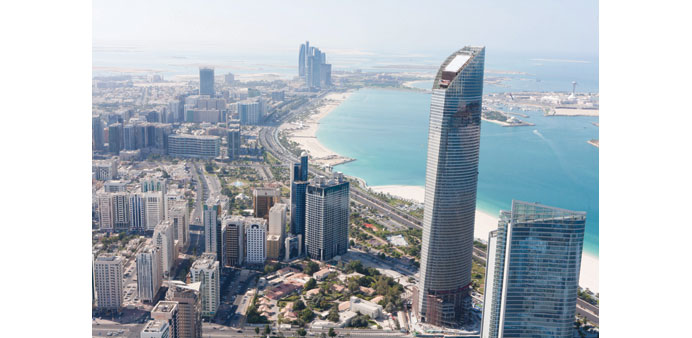Skyscrapers stand on the skyline viewed from the Central Market in Abu Dhabi. Indian Prime Minister Narendra Modi is planning to visit the United Arab Emirates next week to enhance cooperation in energy and trade.
Bloomberg/New Delhi
Narendra Modi heads to the United Arab Emirates in the coming week to seek cash from the world’s second-richest sovereign wealth fund for everything from trains to toilets.
Modi will be the first Indian prime minister in more than 30 years to visit the UAE, India’s third-biggest trade partner. The two-day visit will feature discussions that will probably refer to the sovereign wealth fund, according to Indian Foreign Ministry spokesman Vikas Swarup.
“I seek to enhance cooperation in energy, trade and will talk to investors on why India is an attractive destination,” Modi wrote on Facebook on Thursday.
The Abu Dhabi Investment Authority’s $773bn in assets is second only to those of Norway. Modi is scheduled to meet Sheikh Mohamed bin Zayed al-Nahyan, Abu Dhabi’s Crown Prince who chairs the Abu Dhabi Investment Council, an offshoot of the sovereign wealth fund. A meeting with Dubai Ruler Sheikh Mohammed bin Rashid al-Maktoum is also on the agenda.
Modi said he looked forward to meeting some of the more than 2mn Indians who live in the UAE, many as migrant workers. About 40,000 of them are expected to pour into Dubai’s cricket stadium to hear him speak on August 17.
“No words will be enough to appreciate their hard work and sweat,” Modi wrote.
The Indian community abroad sends home more money than any other group overseas. Their reliable billions provide a cushion for Modi as he struggles to push through economic proposals that may attract more capital inflows.
Rallying overseas Indians long neglected by previous leaders has become a staple of Modi’s foreign trips since he swept to power in May 2014. He’s been greeted like a rock star at splashy events from New York to Sydney, where he’s sought funding for various initiatives including pet projects like building more toilets and cleaning up India.
Dubai may top those in significance because of the sheer flow of money from the Gulf region.Indians working overseas remitted $70.4bn in 2014, double what India attracted through direct foreign investment.
Workers in the Gulf – barred from settling there permanently – accounted for more than half of those flows, and workers in the UAE sent the single biggest chunk of $12.6bn.
Such stable flows are important because they go straight to poor families to fund essentials like education and medicine.
“They act like insurance, rising in times of financial difficulties such as when external private capital flows decrease and the rupee weakens,” said Dilip Ratha, a World Bank economist who pioneered the first global calculations of remittances.
And those numbers are probably even higher than reported.
Official figures only capture money wired through formal channels, with as much as 40% more passing through the underground “hawala” system, Ratha said.
“Modi is really acknowledging the importance of those workers” as he tries to build more strategic ties with the region, said Kadira Pethiyagoda, visiting fellow in Asia-Middle East relations at the Brookings Doha Center.
To modern-day India, the Gulf is the embodiment of money: it’s where the uneducated masses toil as labourers and maids to break out of poverty, where Bollywood stars keep lavish holiday homes.
It’s also where a lucky few have made their fortunes, including retail king MA Yusuffali and Micky Jagtiani, a one-time London cabbie turned mall developer. Billionaire Yusuffali was an early investor in Cochin airport, the first in India constructed with private participation.
“The diaspora is important in every country that Modi visits but it’s even more important in countries of the Gulf,” said Aparna Pande, a South Asia expert at the Washington-based Hudson Institute. “India needs a lot of investment in infrastructure, energy and manufacturing, and the UAE is one of the countries which can invest.”

